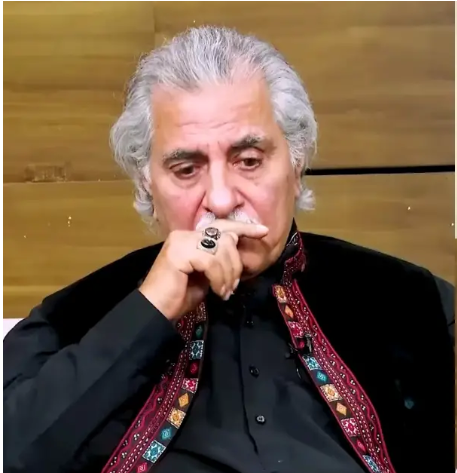Usman Peerzada is a name synonymous with artistic excellence in Pakistan. A multifaceted talent—actor, director, producer, and screenwriter—he has shaped the nation’s cultural landscape for over five decades. From his groundbreaking roles in Pakistan’s first English-language film to his emotionally resonant performances in iconic dramas, Peerzada’s career is a testament to passion, creativity, and cultural preservation. This article dives deep into his life, work, and enduring legacy, offering fans, aspiring artists, and cultural enthusiasts a comprehensive look at a true pioneer of Pakistani arts.
Early Life and Family Heritage
Born into Artistry
Usman Peerzada was born in 1955 in Lahore, Pakistan, into a Punjabi Muslim family steeped in the performing arts. His father, Rafi Peerzada (1898–1974), was a visionary actor and playwright who laid the foundation for modern theatre in Pakistan. Growing up in such an environment, Usman was immersed in creativity from a young age, surrounded by discussions of art, storytelling, and cultural expression.
Actionable Tip: Aspiring artists can draw inspiration from their surroundings. Engage with family or community traditions to find your creative spark, just as Usman did in his formative years.
The Peerzada Family Legacy
The Peerzada family is a powerhouse of artistic talent. Usman’s brother Saadaan Peerzada continues their father’s theatrical legacy through the Rafi Peer Theatre Workshop (RPTW), a cornerstone of Pakistan’s performing arts. Brothers Salmaan and Imran Peerzada are accomplished actors and filmmakers, while their late brother Faizaan Peerzada (1958–2012) was a celebrated puppeteer and artist. Their sister, Tasneem Peerzada, is an Urdu journalist specializing in cultural reporting. Together, the Peerzadas have woven a rich tapestry of contributions across theatre, cinema, television, and journalism, making their family a cultural institution in Pakistan.
Insight: The collaborative spirit of the Peerzada family highlights the power of collective creativity. Building a network of like-minded artists can amplify your impact in any creative field.
Education and Early Artistic Exposure
Usman attended St. Anthony’s High School in Lahore, where his passion for performance began to take shape. He later graduated with an MA in English from Government College University (GCU) in 1974. During his college years, he served as Secretary of the Government College Dramatic Society, organizing and acting in plays. In 1971, he was honored as Best Actor at the Najam-ud-Din Drama Festival at Kinnaird College, Lahore, a recognition that fueled his ambition. These early experiences laid the groundwork for a career defined by versatility and dedication.
Entry into the Performing Arts
Theatrical Beginnings
Usman’s career began in 1974 with college plays and dramatic festivals, where his natural talent for storytelling shone. His ability to connect with audiences through nuanced performances earned him early recognition. These formative years were crucial, teaching him the art of character portrayal and the importance of cultural narratives.
Personal Story: Imagine a young Usman, nervously stepping onto a college stage, unaware that these moments would launch a career that would inspire generations. His journey reminds us that every great artist starts with small, courageous steps.
Breakthrough in Pakistani Cinema
In 1976, Usman landed the lead role in Beyond the Last Mountain, Pakistan’s first English-language film. This milestone not only showcased his acting prowess but also proved that Pakistani stories could resonate globally. The film marked his transition into professional cinema, where he excelled in both Urdu and Punjabi films, earning a reputation for emotional depth and authenticity.
Usman Peerzada’s Film and Television Career
Filmography Highlights
Usman Peerzada’s film career is a blend of acting, directing, producing, and screenwriting. His notable works include:
- Nazdeekiyan (1986): Directed, produced, written, and acted in by Usman, this low-budget Urdu film won four National Awards, including Best Film, and over 17 accolades in total. Its success demonstrated his ability to create impactful stories with limited resources.
- Gori Dyan Jhanjran (1989): A Punjabi film that also received critical and commercial acclaim, showcasing his versatility across languages.
- Other films: Sazish, Wehshi Daku, Shararat, Qarz (1997), Nail Polish, Ladoon Mein Pali, and Abhi Tau Main Jawan Hoo.
His films are celebrated for their emotional resonance and cultural authenticity, often blending traditional Pakistani themes with universal human experiences.
Landmark Television Work
Usman’s television career is equally illustrious, with iconic roles that have become cultural touchstones. His portrayal of Prince Salim in Nangay Paoon remains one of Pakistani television’s most memorable performances. Other notable dramas include:
- Teesra Kinara
- Sofia (1992): Directed and co-starred with his wife, Samina Peerzada.
- Kahi Un Kahi
- Khuda Aur Muhabbat
- Sinf-e-Aahan
- Recent works like Kaffara (2024), Dayan, and Ghaata, showcasing his continued relevance.
His collaborations with Pakistan Television (PTV) and other networks have set benchmarks for quality and storytelling in Pakistani dramas.
Direction and Production
As a director, Usman brought his father’s theatrical legacy to the screen. His directorial ventures include Nazdeekiyan, Gori Dyan Jhanjran, Sofia, and Rangeel Pur (2010), the latter featuring his niece Yamina Peerzada. In 2016, he announced plans to adapt his father’s play Namoos into a film, reflecting his commitment to preserving cultural narratives. His work emphasizes storytelling that resonates with Pakistani audiences while addressing universal themes.
Artistic Vision and Influence
Commitment to Quality and Innovation
Usman’s approach to filmmaking is defined by creative resourcefulness. Nazdeekiyan, made on a shoestring budget, won critical acclaim for its heartfelt storytelling. He advocates for content that reflects Pakistan’s cultural identity while pushing creative boundaries. His work with the Rafi Peer Theatre Workshop (RPTW), founded in 1974, has been instrumental in promoting performing arts globally.
Insight: Innovation doesn’t always require big budgets. Focus on authentic storytelling to create impactful art, as Usman did with limited resources.
Mentorship and Industry Impact
Through RPTW, Usman has mentored countless emerging artists, fostering a new generation of talent. His collaborations with family members, including his wife Samina and niece Yamina, highlight his belief in collective creativity. His influence extends beyond his own work, shaping the evolution of Pakistani drama and cinema by setting high standards for quality and authenticity.
Awards and Recognition
Usman’s contributions have earned him numerous accolades:
- PTV Icon Award (2023): For outstanding contributions to Pakistani cinema and television.
- CPACT Best Iconic Couple Award (2018): Shared with Samina Peerzada for their collaborative legacy.
- Nazdeekiyan won four National Awards, including Best Film of 1986, and over 17 accolades.
These honors reflect his impact as a multifaceted artist and cultural icon.
Personal Life and Collaborations
Marriage and Family
In 1975, Usman married Samina Peerzada, a renowned actress and director. Their partnership is both personal and professional, producing iconic projects like Sofia. They have two daughters, Anum and Amal Peerzada, the latter a miniature artist. Their family embodies a shared commitment to the arts.
The Peerzada Creative Partnership
Usman and Samina’s joint projects, such as Sofia, blend their talents seamlessly. Their work with RPTW, alongside other family members, has made the Peerzadas a driving force in Pakistani arts. Their collective endeavors, including puppetry, film festivals, and theatre, have enriched Pakistan’s cultural landscape.
Legacy and Continuing Relevance
Lasting Impact on Pakistani Arts
Usman Peerzada’s contributions have shaped modern Pakistani theatre, film, and television. Through RPTW, he has preserved and promoted cultural heritage, while his films and dramas have set benchmarks for storytelling. His mentorship and advocacy for artistic integrity continue to inspire artists and audiences alike.
Insight: A lasting legacy requires dedication to both art and community. Engage with your cultural roots to create work that endures.
Current and Future Projects
Usman remains active in the industry, with recent roles in Kaffara (2024), Dayan, and Ghaata. His planned adaptation of Namoos signals his ongoing commitment to meaningful storytelling. At 70, he continues to evolve, proving that passion for art knows no age limit.
Reflections from Peers and Critics
Colleagues describe Usman as a visionary who balances tradition with innovation. Director Ismail Jilani praises his “ability to breathe life into every role,” while actress Hareem Farooq credits his mentorship for her growth. Critics note his knack for blending cultural authenticity with universal appeal, making his work timeless.
Conclusion
Usman Peerzada’s journey from a college stage to a titan of Pakistani arts is a story of passion, resilience, and creativity. His contributions as an actor, director, producer, and screenwriter have not only entertained but also preserved Pakistan’s cultural heritage. Through his work with the Rafi Peer Theatre Workshop and his iconic roles in Nangay Paoon, Nazdeekiyan, and Kaffara, he has inspired generations of artists. As he continues to create and mentor, Usman Peerzada’s legacy remains a beacon for anyone passionate about the arts. Whether you’re an aspiring filmmaker, actor, or cultural enthusiast, his life offers a roadmap to success: stay true to your roots, embrace collaboration, and never stop creating







